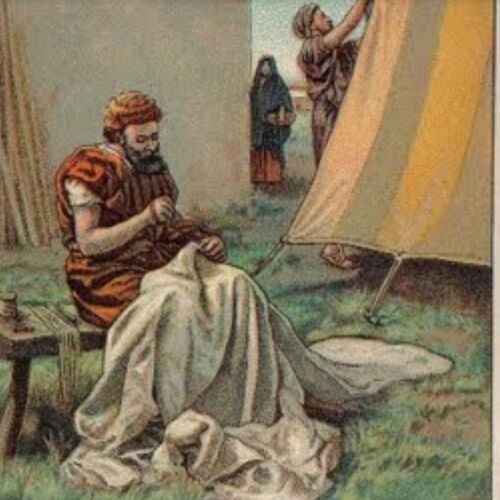
Where did Paul learn to be a tentmaker?
Questions About People In The Bible
Episode · 0 Play
Episode · 8:43 · Aug 17, 2021
About
The apostle Paul was a tentmaker by trade, and he relied on that trade to support himself in Corinth on his second missionary journey. In Corinth, Paul met fellow tentmakers Priscilla and Aquila, and “because he was a tentmaker as they were, he stayed and worked with them. Every Sabbath he reasoned in the synagogue, trying to persuade Jews and Greeks” (Acts 18:3–4).Where Paul learned his trade of tentmaking we simply can’t be sure. The Bible never says. We know that as a young man Paul studied under the tutelage of Rabbi Gamaliel in Tarsus, who provided him with an expert knowledge of the Hebrew Scriptures (Acts 22:3). Those educational credentials allowed Paul to preach in the synagogues wherever he traveled (see Acts 17:2). We also know that Tarsus, where Paul was from, was in the province of Cilicia, famous for raising goats and producing a goats’ hair cloth that was used for tentmaking. In fact, the cloth was named cilicium, after the province of origin.It was standard practice for Jewish rabbis to have learned a trade. Rabbi Hillel, the grandfather of Gamaliel, was a carpenter. Paul’s trade was that of tentmaking. It could have been a business his family was involved in. It’s also possible that Paul learned and began to practice tentmaking during his school years. Another possibility is that he became a tentmaker during his ministry or in the time between his road-to-Damascus conversion and the beginning of his ministry (see Galatians 1:17).Paul turned to his training as a tentmaker in certain situations so as not to be a burden to the churches he was nurturing and to avoid accusations that he was preaching for gain. He told the elders in Ephesus, where he had spent two years, “I have not coveted anyone’s silver or gold or clothing. You yourselves know that these hands of mine have supplied my own needs and the needs of my companions” (Acts 20:33–34).Most likely, tentmaking was not a big part of Paul’s life in general. His focus was always preaching the gospel of Christ (see 1 Corinthians 2:2). Being a tentmaker was probably only something he did on occasion, as a fallback. Author E. Randolph Richards points out that, “as a traveler, Paul did not carry the supplies necessary to conduct a significant business as a tentmaker. . . . In the ancient Greco-Roman world, it took considerable time to establish the necessary relationships in order to gain the necessary permissions to conduct business in a city, both from city leaders as well as the appropriate guilds. Paul was able on occasion to enter into business, but only in situations such as Corinth, where he was actually assisting in an established business with an established shop with regular suppliers, owners with memberships in the appropriate trade guilds and a regular clientele” (Paul and First-Century Letter Writing: Secretaries, Composition, and Collection, InterVarsity Press, 2004, p. 170).When it comes down to it, the Bible just gives us broad, “big-picture” overviews of most of the events it discusses, including the ministries of major figures like Paul. The book of Acts, for example, doesn’t mention Paul’s heading to Arabia for a while before beginning his ministry; we don’t learn about that episode until Paul mentions it in his letter to the Galatians. So, even though we’re told Paul was a tentmaker by trade and he served in that capacity at times, it’s impossible to say with certainty how or when he learned the trade or how much tentmaking he actually did during his ministry.www.keithmuoki.com
8m 43s · Aug 17, 2021
© 2021 Spreaker (OG)